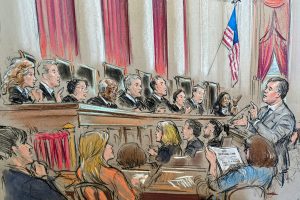A New England man planted a fake bomb on the Harvard University campus last month as part of an attempt to extort a “large” amount of Bitcoin from the Ivy League school, according to a criminal complaint unsealed Tuesday.
Problem is, he didn’t do a very good job of covering his tracks.
William A. Giordani, 55, was arrested on Tuesday by federal agents and remains detained pending a Friday court hearing. He stands charged in Massachusetts federal court with conspiracy, along with aiding and abetting an extortionate threat.
It all began with a Craigslist ad.
On April 11, someone using the name “Nguyen Mihn” posted an ad—which is still live—looking for someone to do a “small side job” in Cambridge.
The poster said they would pay $300 to deliver supplies to the man’s child and listed a Google Voice number with a New Jersey area code.
Shortly before 2:30 p.m. on April 13, the Harvard University Police Department received a call from what sounded like a computer-generated male voice, the complaint states, noting that it came from the same New Jersey number that placed the Craigslist ad.
“There are three bombs planted around the Harvard Campus and we are ready to provide undeniable proof,” the voice said.
Each device had “an explosive yield of at least 80 megajoules and contain several pounds of metal shrapnel,” the caller continued, saying that he estimated the force would kill at least 40 students and injure hundreds more.
The caller gave the Harvard police 100 minutes to meet his demands, according to the complaint.
“In the meantime, you should begin preparing a large bitcoin transaction as soon as possible so that any technical difficulties can be resolved in the next 96 minutes,” the caller continued. “We also request that you send the bitcoin using the fastest available transaction speed because if we cannot completely confirm payment when 100 minutes is up we will detonate the bombs regardless of whether there is a transaction in progress.”
The caller said the amount would be supplied, along with instructions for the transfer, in a forthcoming text message, the complaint states.
Between 2:36 p.m. and 4:06 p.m., the Harvard cops received another six calls—five of them from the New Jersey number—with demands for payment. During the fourth call, the mechanical-sounding voice said one of the devices was on the Science Center Plaza, in a red-and-black Husky tool bag located between food trucks, according to the complaint.
In the meantime, Harvard police officers went to the plaza and found the Husky tool bag on a bench, according to the complaint, which says they then cordoned off the area around the bag and cleared the adjacent buildings. The Cambridge Police Department’s bomb disposal unit arrived shortly thereafter, and used a robot to execute a controlled destruction of the bag. (The complaint does not say what happened to the other two bombs the caller said were on campus, or if they existed in the first place.)
Inside the bag was a metal locking safe of the type normally found in hotel rooms, a package of wire, a bundle of fireworks, and a small rectangular box with wires attached to it, the complaint states. The package of wire had a yellow Home Depot sticker attached to it with the name “Nguyen Minh” on it, and the same New Jersey phone number the Craiglist poster and caller had used. It also included an order number, the store manager’s name, and the phone number of a Home Depot in Boston.
Investigators reviewed surveillance footage from the scene, and spotted a “white male wearing a blue short sleeved shirt and shorts, carrying a red and black tool bag in his right hand” walk onto the Science Center Plaza just after 2 p.m. and place the bag on a bench.
Agents spoke to the manager of the Home Depot where the wire, the safe, and the tool bag had been purchased. He said the order was placed online on April 13 at 6:52 a.m. under the name Minh Nguyen, for a total of $170.96. It was paid via a Home Depot gift card, according to the complaint. But the pickup, security video from the store showed, was made at about 11:45 a.m. that same day by Giordani, who agents also IDed as the man in the Science Center Plaza, the complaint states.

Investigators called Giordani, who was “reluctant” to speak with them but agreed to meet in Tyngsboro, Massachusetts on the morning of April 27. However, he never showed up.
“Officers spoke with him on the telephone again and Giordani claimed that he was not comfortable meeting because he could not verify the fact that the officers were in fact who they said they were,” the complaint goes on. “Giordani suggested that officers speak with his mother… which they did.”
Giordani’s mom promised to bring her son to the FBI office in Bedford, New Hampshire, on May 1. But again, Giordani “refused to accompany her to the meeting,” according to the complaint. The officers asked Giordani’s mother to call him and “encourage him to come to the FBI office,” which she did on speakerphone.
When he answered, Giordani said he knew the FBI wanted to speak with him, but was afraid of getting arrested for transporting fireworks across state lines, the complaint continues.
Giordani claimed he went to Worcester to get paid, but that the person stood him up. He also said the person “wasn’t Asian (as claimed in the Craigslist ad), didn’t have kids (as claimed in the ad), and started ‘spouting off a bunch of racist things about blacks and Jews,’” the complaint says.
Still dragging his feet on speaking to investigators, Giordani asked his mom to pick him up in Nashua, New Hampshire. She drove there with agents and officers, who approached Giordani and introduced themselves.
“Giordani was extremely displeased by [his mom’s] decision to bring officers with her to the meeting and berated her,” according to the complaint. “Officers sought to calm Giordani, and then requested to speak with Giordani about the Craigslist ad and the events at Harvard.”
Giordani refused to let investigators search his phone or discuss the incident in detail, arguing that the device was “his business phone” and that it contained “intimate photographs,” the complaint concludes. “While declining to show officers his mobile phone, Giordani admitted that he knew what he did was wrong and that he ‘just put some fireworks in a safe and put them at Harvard.’”
Nguyen’s identity, if he is a real person, is unclear. Giordani appeared before a federal magistrate judge on Tuesday afternoon, and is scheduled to appear again on Friday, when a lawyer will be appointed to represent him, according to court records.
If convicted on both charges, Giordani faces a combined maximum of 25 years in prison.





